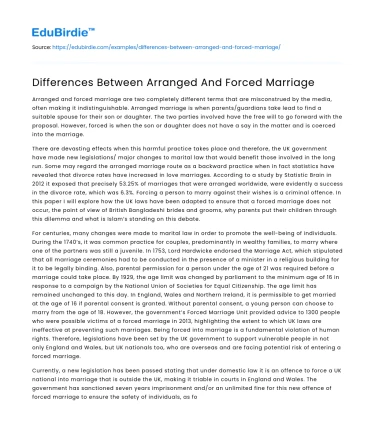Arranged and forced marriage are two completely different terms that are misconstrued by the media, often making it indistinguishable. Arranged marriage is when parents/guardians take lead to find a suitable spouse for their son or daughter. The two parties involved have the free will to go forward with the proposal. However, forced is when the son or daughter does not have a say in the matter and is coerced into the marriage.
There are devasting effects when this harmful practice takes place and therefore, the UK government have made new legislations/ major changes to marital law that would benefit those involved in the long run. Some may regard the arranged marriage route as a backward practice when in fact statistics have revealed that divorce rates have increased in love marriages. According to a study by Statistic Brain in 2012 it exposed that precisely 53.25% of marriages that were arranged worldwide, were evidently a success in the divorce rate, which was 6.3%. Forcing a person to marry against their wishes is a criminal offence. In this paper I will explore how the UK laws have been adapted to ensure that a forced marriage does not occur, the point of view of British Bangladeshi brides and grooms, why parents put their children through this dilemma and what is Islam’s standing on this debate.
Save your time!
We can take care of your essay
- Proper editing and formatting
- Free revision, title page, and bibliography
- Flexible prices and money-back guarantee
For centuries, many changes were made to marital law in order to promote the well-being of individuals. During the 1740’s, it was common practice for couples, predominantly in wealthy families, to marry where one of the partners was still a juvenile. In 1753, Lord Hardwicke endorsed the Marriage Act, which stipulated that all marriage ceremonies had to be conducted in the presence of a minister in a religious building for it to be legally binding. Also, parental permission for a person under the age of 21 was required before a marriage could take place. By 1929, the age limit was changed by parliament to the minimum age of 16 in response to a campaign by the National Union of Societies for Equal Citizenship. The age limit has remained unchanged to this day. In England, Wales and Northern Ireland, it is permissible to get married at the age of 16 if parental consent is granted. Without parental consent, a young person can choose to marry from the age of 18. However, the government’s Forced Marriage Unit provided advice to 1300 people who were possible victims of a forced marriage in 2013, highlighting the extent to which UK laws are ineffective at preventing such marriages. Being forced into marriage is a fundamental violation of human rights. Therefore, legislations have been set by the UK government to support vulnerable people in not only England and Wales, but UK nationals too, who are overseas and are facing potential risk of entering a forced marriage.
Currently, a new legislation has been passed stating that under domestic law it is an offence to force a UK national into marriage that is outside the UK, making it triable in courts in England and Wales. The government has sanctioned seven years imprisonment and/or an unlimited fine for this new offence of forced marriage to ensure the safety of individuals, as forced marriages involve a wide range of abuse including rape, assault and unlawful captivity.
According to Home Secretary Theresa May, “a forced marriage is a tragedy for each and every victim, and its very nature means that many cases go unreported.” This not only demonstrates that forced marriages are destructive, but also identifies the extent of the damage that it causes upon its victims. To confront this issue, she was “proud to say that the UK is already a world-leader in the fight to stamp out this harmful practice with the government’s Forced Marriage Unit working hard to tackle this terrible practice in the UK and overseas.” Therefore, since many laws have been passed, it highlights the growing number of forced marriages across the UK and how many people are potential victims. Moreover, with today’s criminalisation by the government, victims are ensured the protection by the law and have been given confidence, safety and freedom to choose.






 Stuck on your essay?
Stuck on your essay?

